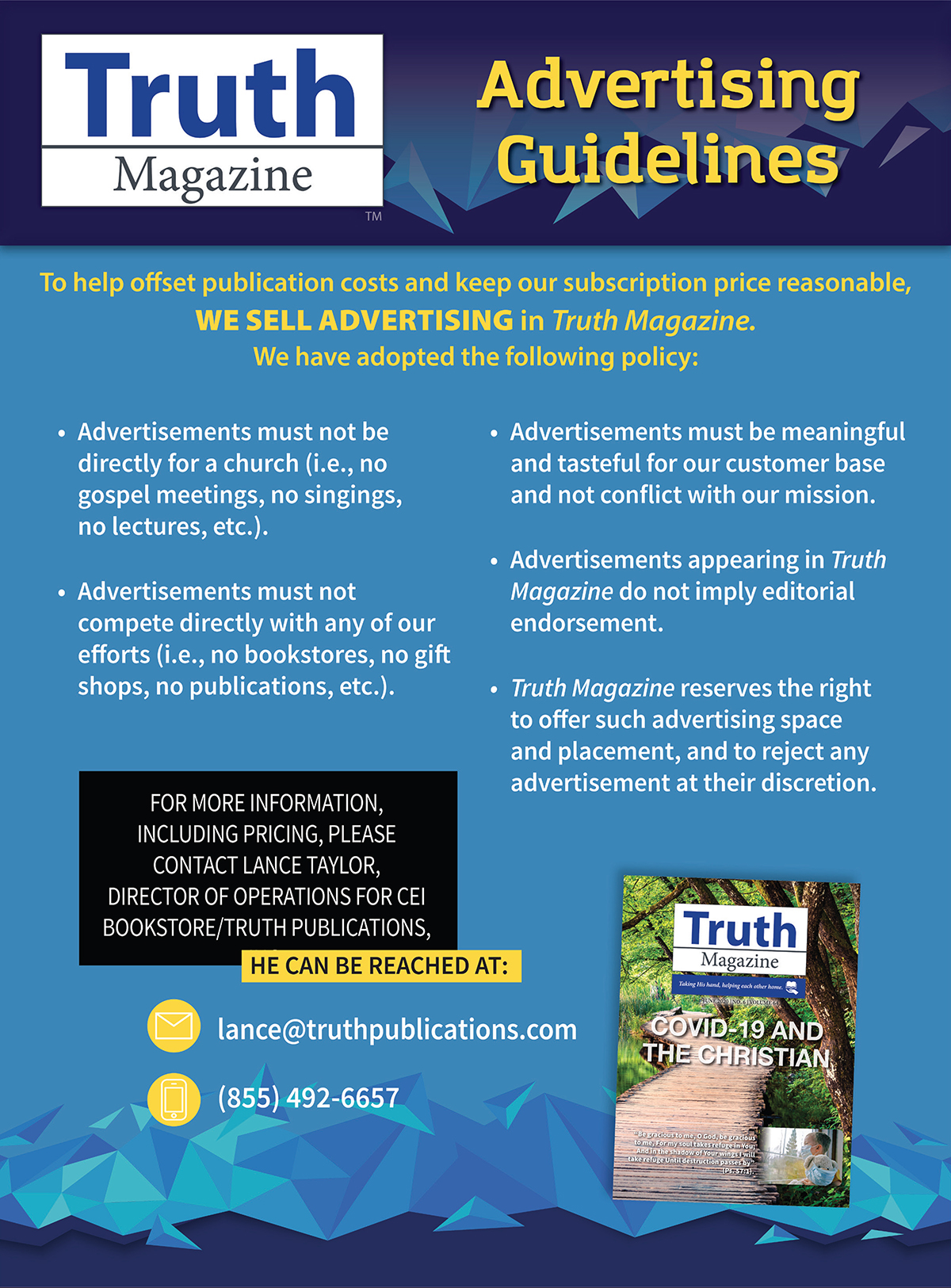OPEN ISSUE: Diagnosing Routines

Wayne Gretzky, the famous hockey player, once said, "No matter who you are, we're creatures of habit. The better your habits are, the better they will be in pressure situations." Let us explore the significance of spiritual routines.
Introduction
Last spring, the church, both locally and globally, had its regular practices wholly disrupted by the COVID pandemic. Schedules were changed, meeting places were closed, classes were cancelled, start times were altered, gospel meetings were postponed, and public worship was impacted in ways that no one could have predicted. Some areas, such as the West Coast, experienced more significant effects than other regions due to strict health mandates resulting in complete cancellation of services and longer periods of separation from Christian friends and family. Our enemy, the devil, is using this crisis as an opportunity to test the Lord’s people. Let us continue to pray that this ends soon and that Satan’s scheming attempts to cause division in the church and damage fellowship between brethren are defeated. Arguing over the use of masks, meeting times, and virtual assemblies plays into his hand and will only have a detrimental effect on the Lord’s church.
Human beings are creatures of habit, so disruption of our routines is especially challenging. Routines are a part of everyday life. One’s morning routine might include waking up, sliding on our slippers, grabbing our robe, and making our way to the kitchen for coffee or tea. Similarly, moms have patterns for rousing kids for school, getting them dressed and fed to start a new day. All have daily, weekly, and monthly routines—such patterns of behavior help us maintain order and control while easing stress.
While everyday routines are helpful, our spiritual habits are even more critical. For example, God demands that His followers regularly attend worship services. The Hebrew writer warns against “abandon(ing) our own meeting together.” Instead, saints should be devoted to “encouraging one another” (10:25). If the Lord’s body is to thrive, regular fellowship is vital. We need the edification of our brethren; without it, we suffer spiritually.
Daily Bible reading and the study of God’s written word should be a critical part of our spiritual routine. So also, are regular Bible studies with our children. Making phone calls or visiting with fellow Christians are helpful spiritual routines. These are all good practices that we should involve ourselves with, in one form or another. What about praying? Daniel serves as an excellent example:
Now when Daniel learned that the document was signed, he entered his house (and in his roof chamber he had windows open toward Jerusalem); and he continued kneeling on his knees three times a day, praying and offering praise before his God, just as he had been doing previously (Dan. 6:10).
So, routines are essential, and we are wired in such a way where these can, and in many cases should, become automatic to us—like an involuntary function.
In industry, routines and processes are put in place to protect employees from injury. Safety routines are written up and enforced so that standard procedures are followed when loading or unloading hazardous materials. Plant operators must strictly adhere to shutdown and startup routine manuals to prevent catastrophic accidents from occurring. Terrible results may occur when and where such guidelines are ignored, or if an attitude of casualness or laziness is present.
The term “routine,” in its noun form, is defined as “a sequence of actions regularly followed; a fixed program.” It involves steps or procedures put in place to accomplish an end. Paul had a routine that he practiced in reaching out to the lost. In Acts 17:1-3, we read:
Now when they had traveled through Amphipolis and Apollonia, they came to Thessalonica, where there was a synagogue of the Jews. And according to Paul’s custom, he visited them, and for three Sabbaths reasoned with them from the Scriptures, explaining and giving evidence that the Christ had to suffer and rise from the dead, and saying, “This Jesus whom I am proclaiming to you is the Christ.”
Paul took advantage of every opportunity he was given to share the good news with the lost. It was his routine on the Sabbath to go to the synagogue to teach the Jews. “Practice makes perfect,” and this routine surely must have sharpened his skills of communicating and sharing the saving gospel. Our prayer should be, “Lord, help us have the same courage as the Apostle Paul and share your gospel when given the opportunity.”
In Luke 4:16, we read that Jesus was customarily present in the synagogue on the Sabbath to engage in reading the Scripture. Paul, being inspired by the Holy Spirit, indeed would have known of the Lord’s practice and routine of speaking to the Jews in the city synagogues. Perhaps this was the example that caused Paul to practice the same on his journeys?
When used as an adjective, the term “routine” is defined as: “of a commonplace or repetitious character; ordinary.” This form of the word should never be used to describe worship to our heavenly Father. Our worship of God should never become commonplace but instead be treated with utmost honor and respect when fulfilling this blessed command (Ps. 95:6, Heb. 12:28). No experience on earth should delight our souls and provide more joy than coming together with brethren for worship and offering praise to our heavenly Creator. Regularly scheduled assemblies should be viewed as the highlight of our week and set our rhythm from week to week.
Never in my lifetime have I cherished more, or recognized the importance of assembling with my brethren more, than I have over this last year. As God’s people, we can, now more than ever, fully appreciate the words of the Hebrew writer when he wrote, “but exhorting one another, and so much the more as you see the Day approaching.”
When our worship becomes routine and lackadaisical, we rob ourselves of the benefit and blessings of growth and edification. Carelessness in worship is precisely caused God to condemn the children of Israel repeatedly. Malachi 1:8 states, “‘And when you present a blind animal for sacrifice, is it not evil? Or when you present a lame or sick animal, is it not evil? So offer it to your governor! Would he be pleased with you, or would he receive you kindly?’ says the LORD of armies.” The worship they were offering was called “evil,” and it was unacceptable in the sight of God. They had grown so arrogant that they asked God, “In what way have we defiled You?”
What had happened to their desire for pure worship? It had become insignificant in their lives; it had become routine. If we permit Satan to do so, he will use such crises to place stumbling blocks before us and diminish our respect for the importance of worship. May it never be!
Below are a few Scriptures describing some Bible characters in how they responded and conducted their worship to God. Routine was hardly a part of these settings:
- Moses took off his shoes (Exod. 3)
- Israel was struck with fear (Exod. 20)
- Isaiah’s house quaked (Isa. 6)
- Job silenced his lips (Job 40)
- John fell down as though dead (Rev. 1)
- The twenty-four elders and angels, who are worshipping daily before the throne are humble as they glorify the Lord (Isa. 6; Rev. 4)
Let us be careful that our worship of the sovereign Almighty God of the universe never becomes routine. There is a sincerity that must attend it and a seriousness that must exist in it. 
by Darin Henry

